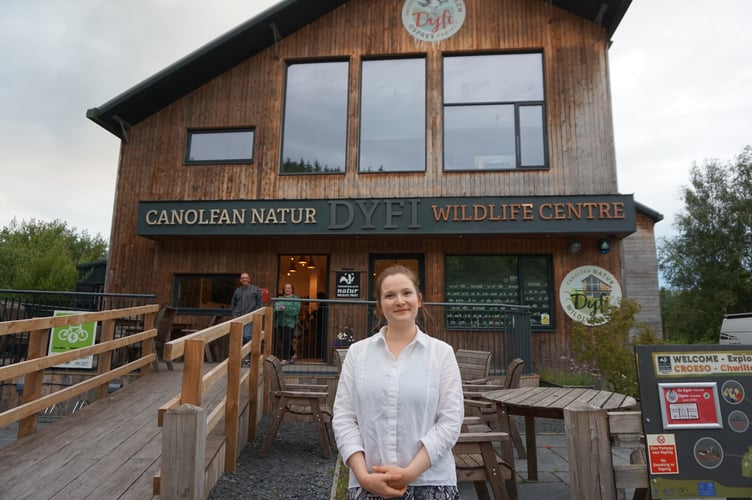Would you eat insects for lunch?
That’s the question student Laurie Stevenson asked last week at a one-off event for the Dyfi Wildlife Centre - a four-course insect dinner.
The plucky 22-year-old asked diners to say ‘grubs up’ to the meal which included a ‘bug-ger’, critter fritters, fly-lafels and a James and the Giant Peach tart.
However rather than grimaces, the room nearly full of diners who paid £35 each for the unique experience, wore smiles as they tucked into the food incorporating mealworm, cricket and locust flour.

On welcoming the guests Stevenson said: “It’s a credit to each of you that you’re here tonight because this is something that’s so out there, not everyone - and I mean not everyone - would have wanted to come tonight.
“That shows you are forward-thinking, progressive and open-minded and we need others like you.”
The whole point of the meal, explained chef Stevenson, was to prove that including insects in our food habits doesn’t have to be ‘Bear Grills-like skewered locusts’ - that it can be tasty, and even good for you.
She explained that insect flour has three times the amount of protein as steak - 100g of beef steak provides roughly 20g of protein, whilst 100g of insect flour provides an average of 60g of protein.
Whilst helping you get your daily dose of protein which helps build muscle, gives you energy and may help lose fat, farming insects is also less impactful on the planet.
Studies have found insect farming uses up to 90 per cent less land, 80 per cent less feed and 2,000 times less water to produce, and creates up to 2,700g less greenhouse emissions than protein grown through conventional livestock like sheep, cows and pigs.
So what does this actually taste like?
Diner Alex Randall said of the critter fritters: “It tastes like a normal fritter, it doesn’t taste insect-y.
“There’s no antenna sticking out, it tastes spicy.”

The diners' feedback at the dinner on 5 July will be used in Laurie’s PhD at the University of Surrey in ‘optimising the safety and nutritional quality of insect protein ingredients’.
All the food included a supplement of insect flour - for the tart, Stevenson replaced one-third of wheat flour with cricket flour.
So why were these diners putting themselves through the bushtucker trial?
A diner who works in sustainability and environmental management said: “I’m keenly interested in understanding sources of food.
“I know insect proteins are far less energy-dense than animal proteins and it's a far more sustainable way of feeding the planet.
“The fritters were lovely - I could imagine them eating them myself dipping them in hummus - you wouldn’t know they were insect-based at all.
“I think people being exposed to using new ingredients like this is a way of normalising it and losing that shame value of it being made of bugs so it’ll taste yucky.”
Louis Chow, a mechanical engineer, said it was his first time eating insects: “I go to the gym often so wanted to learn more about different protein consumption.
“I’ve been told insects are efficient and I like trying new things.
“I don’t believe the tart has insect in it- there’s no difference between this and any other tart. I would have it again.”

Karen Proctor, a Powys-based dietician, came to learn more about sustainable sources of protein for her clients: “I’ve long been an advocate of eating more sustainable sources of protein including plant proteins from pulses but I really do think insects are the way forward in terms of good quality protein that can be sustainably farmed and harvested.
“A lot of people especially when they get older struggle to get sufficient amounts of protein in their diet, something like insect flour could be a really easy way to stir into things they’re cooking- currently I suggest whey protein but insect protein could be even better.
“We’re in a climate emergency and we need to change the way we eat and I think this is a way forward- we need to get around people's aversion to eating insects and this kind of event is a good way of showing there’s nothing scary aobut it.”
Over the dinner attendees discussed sustainable food sources including some people's partiality for roadkill (according to one, there are many quiet roads full of pheasants who don’t get out of the way quickly enough).
Who else is doing this?
Singapore’s Food Agency recently approved 16 insects safe for human consumption including four types of crickets, two grasshoppers, a locust and honeybee, three types of mealworm, a giant rhino beetle grub and two types of moth.
But this isn’t a new phenomenon, 128 countries have 2,205 insect species as part of their diets, with hundreds of types consumed in Thailand, India and the Democratic Republic of Congo.

Countries like Germany, the Netherlands and Denmark are leading the way in Europe in beginning to commercially farm insects for human consumption.
Several companies already farm insects in the UK including two Stevenson used for her ingredients - Crunchy Critters and BugVita.
More locally, several diners had already eaten at Pembrokeshire’s Bug Farm which boasts the UK’s first full-time edible insect cafe and restaurant.
The attraction, opened in 2015, doesn’t ‘farm’ bugs on a commercial scale but serves bug-based dinners at their Grub Kitchen as well as researching insect farming for food, feed and land management.
Grub Kitchen serves insect dishes including VEXo Bolognese, a bug burger and cricket cookies, as well as non-insect dishes for those who’d rather not. They also sell food to take home including cricket insect powder, whole crickets and cricket cookies.
Sarah Kay-Purdon, a diner at the Dyfi Wildlife Centre who had visited the Bug Farm, said: “I’m vegetarian most of the time, I’ve eaten meat twice this year.
“I want to rebel against the squeamishness that puts people off exploring insect protein.
“My dogs have eaten insect protein their entire lives and I think it’s something people could do more of.
“The meal tonight is very tasty- you could have fed this to anyone.”

Stevenson, a former Aberystwyth University student, started by looking into the sustainability of duckweed as feed for livestock: “I’m really interested in food sustainability, particularly protein.
“We’ve got a global protein deficit - we’re going to run out of protein.
“We’ve got enough carbohydrates to feed the world but protein is what’s needed particularly in the developing world for food security.”
But it hasn’t all been plain sailing for the researcher, she’s already come up against criticism from those who fear scientists are trying to replace Welsh farming with insect cultivation: “I’m not here to put this as a solution to everything.
“It’s got to be a multifaceted approach - we need to consume less meat, particularly red meat, but we can’t do that without looking for replacements.
“This is one possible replacement we can use.
“Anthropologically we would have eaten insects as part of our diet, currently a third of the global population have insects as part of their diet.
“It’s also a more efficient way of eating - we eat the whole insect whereas we only eat roughly 40 per cent of a cow.”




